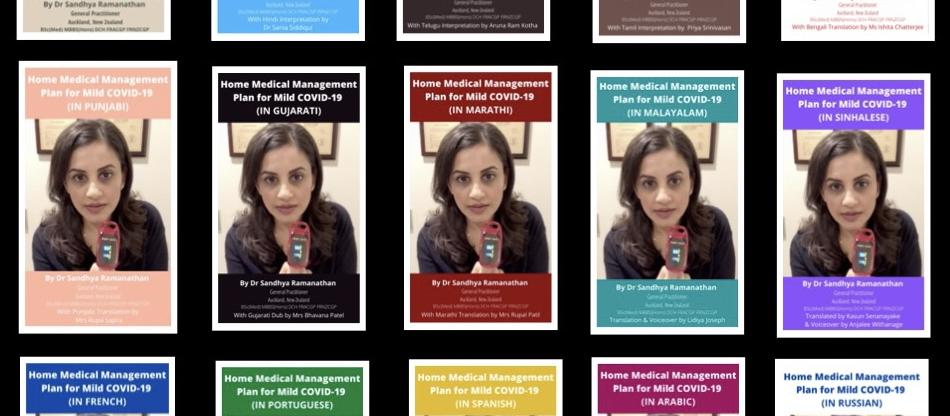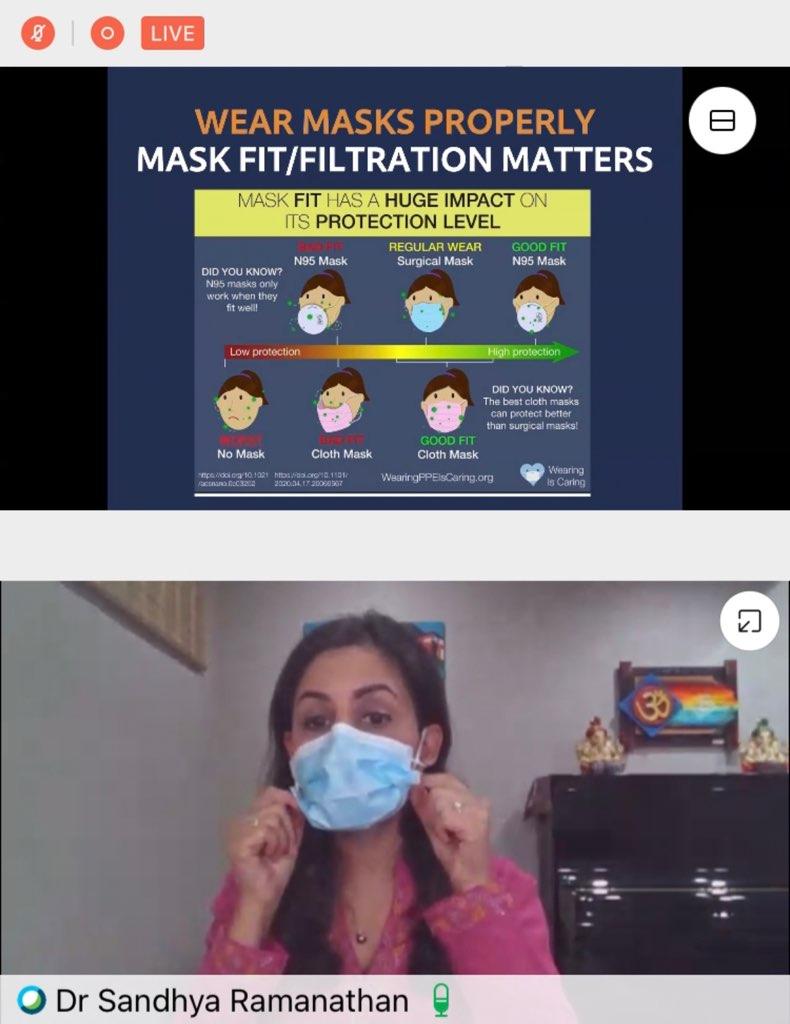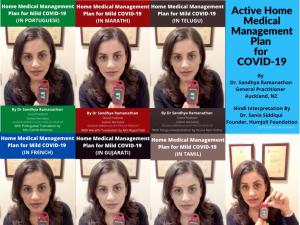Respiratory physician Lutz Beckert considers chronic obstructive pulmonary disease management, including the prevention of COPD, the importance of smoking cessation and pulmonary rehabilitation, and the lifesaving potential of addressing treatable traits. He also discusses the logic of inhaler therapy, moving from single therapy to dual and triple therapy when indicated, as well as other aspects of management
#SOSIndia: Local GP responds to call from India for virtual-consult doctors
#SOSIndia: Local GP responds to call from India for virtual-consult doctors

We're republishing this article in our Undoctored free access space so it can be read and shared more widely. Please think about supporting us and our journalism – subscribe here
“No matter how well you control [COVID-19] in your country if there are places in the world where there is uncontrolled replication then there’s always the risk of further mutation”
A Grey Lynn GP is responding to an SOS call from COVID-19-struggling India to help pull together a group of overseas Indian doctors ready to offer free virtual consults to hard-hit families.
Sandhya Ramanathan received the request overnight from a division of India’s National Institute of Disaster Management (NIDM) to help India’s fight against a devastating second wave of the pandemic.
“Let’s hope we can help,” says Dr Ramanathan by text. “It’s beyond a nightmare in Delhi right now.”
“People fighting over wood to cremate family…[and that’s not for] individual funeral pyres but in groups.”
The GP, whose COVID-19 home care video went viral last year in India with millions of shares, is setting up a WhatsApp group of volunteers in response to the Child Centric Disaster Risk Reduction (CCDR) centre of NIDM request.
The centre’s message, with the hashtag #SOSIndia, seeks overseas doctors, counsellors and mental health experts of Indian origin to help set up a free teleconsultation portal for children and their families.
The message talks of the unprecedented situation and its plan to offer a teleconsult platform, subject to Indian government approval, with overseas help.
Dr Ramanathan says the first appeal is for Indian health professionals, as she thinks it will be easier for doctors of Indian origin to help.
India’s health ministry is reporting an estimated 2.88 million active cases of COVID-19 – more than double last September’s official peak of 1 million active cases. More than 300,000 cases a day have been confirmed by the ministry over the past week.
The official daily death rate is up to 2700 a day, but the actual death rate from COVID-19 is suspected to be much higher, with overcrowded hospitals unable to cope with the number of seriously ill people.
The world needs to pitch in and help as India struggles under a second devastating COVID-19 wave, Dr Ramanathan told New Zealand Doctor Rata Aotearoa yesterday.
She agrees with the “no one is safe until everyone is safe” message promoted by global health leaders such as US presidential medical adviser Anthony Fauci.
“No matter how well you control [COVID-19] in your country, if there are places in the world where there is uncontrolled replication then there’s always the risk of further mutation,” says Dr Ramanathan.
“That’s the other thing I keep saying, viruses can’t mutate if you don’t allow them to replicate”.
The Indian-born, Australian-raised and educated GP says reports via extended family and friends is of “a disaster”, with people bewildered, angry and struggling to find hospital beds for the severely ill.
Countries such as New Zealand can help, with moves like the proposed volunteer virtual consults, but also with oxygen and other health supplies, and by supporting India’s vaccination campaign, she says.
The second wave is also causing concern for the higher proportion of people under 45 reported to be coming seriously ill, along with the number of infected children showing mild-to-moderate symptoms, says Dr Ramanathan.
Concern about children’s safety in the second wave saw her invited to speak at an online workshop on Saturday organised by NIDM and UNICEF India.
Dr Ramanathan says political complacency and more transmissible COVID variants seem to be behind the second wave, though genome sequencing is not keeping up with the rapid growth in cases.
Her presentation stressed that increased transmissibility means families need better defences, not more of the same focusing on hands [washing], face [mask-wearing], space [social distancing] and replace [ventilation] to prevent infection, as well as advocating for vaccination and advising on home care.
Her homecare for COVID-19 patients video, mostly shared via WhatsApp, is “going bananas again” in India as hospitals fill and oxygen supplies are strained, says Dr Ramanathan.
The video is now available in 15 languages and a dub into the last of the major Indian languages to be covered, Kannada spoken by 43 million people in mostly Southern India, is now under way.
Earlier this month, she received an appreciative tweet from an immune-suppressed Irish woman, thanking her for the video and home breathing exercises which she credited for helping save her life during a six-week fight against COVID.
Dr Ramanathan says she has pulled out two excerpts from her original homecare video focusing on the breathing exercises, using a balloon or drinking straw, and on using prone positioning on a pillow or “child’s pose” to help maintain oxygen saturation and prevent lung failure.
She has also created a two-minute demonstration to help people tighten and fit their mask properly, which has been viewed more than 27,000 time via Twitter.
With her extended family in one of the second wave’s epicentres, Delhi, she is hearing “all the bad stuff” and is trying to do her bit through sharing widely her educational videos and tweets.
“I can just imagine the stress, nobody knows what the next day is going to bring.
“A friend here says their friend who lives near a cremation ground reports its ‘24/7 stench of burning bodies’. And you don’t even know the ashes you are getting are your own relative’s ashes. It is just horrific.”
Others have reported medicines, that usually retail for around $150, selling for more than $5000 on the black market as people try anything to help their loved ones.
Indian doctors and counsellors willing to offer some time to the proposed teleconsultation portal can contact her at: sandhya_ramanathan@hotmail.com









![Barbara Fountain, editor of New Zealand Doctor Rata Aotearoa, and Paul Hutchison, GP and senior medical clinician at Tāmaki Health [Image: Simon Maude]](/sites/default/files/styles/thumbnail_cropped_100/public/2025-03/Barbara%20Fountain%2C%20editor%20of%20New%20Zealand%20Doctor%20Rata%20Aotearoa%2C%20and%20Paul%20Hutchison%2C%20GP%20and%20senior%20medical%20clinician%20at%20T%C4%81maki%20Health%20CR%20Simon%20Maude.jpg?itok=-HbQ1EYA)
![Lori Peters, NP and advanced health improvement practitioner at Mahitahi Hauora, and Jasper Nacilla, NP at The Terrace Medical Centre in Wellington [Image: Simon Maude]](/sites/default/files/styles/thumbnail_cropped_100/public/2025-03/2.%20Lori%20Peters%2C%20NP%20and%20advanced%20HIP%20at%20Mahitahi%20Hauora%2C%20and%20Jasper%20Nacilla%2C%20NP%20at%20The%20Terrace%20Medical%20Centre%20in%20Wellington%20CR%20Simon%20Maude.jpg?itok=sUfbsSF1)
![Ministry of Social Development health and disability coordinator Liz Williams, regional health advisors Mary Mojel and Larah Takarangi, and health and disability coordinators Rebecca Staunton and Myint Than Htut [Image: Simon Maude]](/sites/default/files/styles/thumbnail_cropped_100/public/2025-03/3.%20Ministry%20of%20Social%20Development%27s%20Liz%20Williams%2C%20Mary%20Mojel%2C%20Larah%20Takarangi%2C%20Rebecca%20Staunton%20and%20Myint%20Than%20Htut%20CR%20Simon%20Maude.jpg?itok=9ceOujzC)
![Locum GP Helen Fisher, with Te Kuiti Medical Centre NP Bridget Woodney [Image: Simon Maude]](/sites/default/files/styles/thumbnail_cropped_100/public/2025-03/4.%20Locum%20GP%20Helen%20Fisher%2C%20with%20Te%20Kuiti%20Medical%20Centre%20NP%20Bridget%20Woodney%20CR%20Simon%20Maude.jpg?itok=TJeODetm)
![Ruby Faulkner, GPEP2, with David Small, GPEP3 from The Doctors Greenmeadows in Napier [Image: Simon Maude]](/sites/default/files/styles/thumbnail_cropped_100/public/2025-03/5.%20Ruby%20Faulkner%2C%20GPEP2%2C%20with%20David%20Small%2C%20GPEP3%20from%20The%20Doctors%20Greenmeadows%20in%20Napier%20CR%20Simon%20Maude.jpg?itok=B0u4wsIs)
![Rochelle Langton and Libby Thomas, marketing advisors at the Medical Protection Society [Image: Simon Maude]](/sites/default/files/styles/thumbnail_cropped_100/public/2025-03/6.%20Rochelle%20Langton%20and%20Libby%20Thomas%2C%20marketing%20advisors%20at%20the%20Medical%20Protection%20Society%20CR%20Simon%20Maude.jpg?itok=r52_Cf74)
![Specialist GP Lucy Gibberd, medical advisor at MPS, and Zara Bolam, urgent-care specialist at The Nest Health Centre in Inglewood [Image: Simon Maude]](/sites/default/files/styles/thumbnail_cropped_100/public/2025-03/7.%20Specialist%20GP%20Lucy%20Gibberd%2C%20medical%20advisor%20at%20MPS%2C%20and%20Zara%20Bolam%2C%20urgent-care%20specialist%20at%20The%20Nest%20Health%20Centre%20in%20Inglewood%20CR%20Simon%20Maude.jpg?itok=z8eVoBU3)
![Olivia Blackmore and Trudee Sharp, NPs at Gore Health Centre, and Gaylene Hastie, NP at Queenstown Medical Centre [Image: Simon Maude]](/sites/default/files/styles/thumbnail_cropped_100/public/2025-03/8.%20Olivia%20Blackmore%20and%20Trudee%20Sharp%2C%20NPs%20at%20Gore%20Health%20Centre%2C%20and%20Gaylene%20Hastie%2C%20NP%20at%20Queenstown%20Medical%20Centre%20CR%20Simon%20Maude.jpg?itok=Z6u9d0XH)
![Mary Toloa, specialist GP at Porirua and Union Community Health Service in Wellington, Mara Coler, clinical pharmacist at Tū Ora Compass Health, and Bhavna Mistry, specialist GP at Porirua and Union Community Health Service [Image: Simon Maude]](/sites/default/files/styles/thumbnail_cropped_100/public/2025-03/9.%20Mary%20Toloa%2C%20Porirua%20and%20Union%20Community%20Health%20Service%20in%20Wellington%2C%20Mara%20Coler%2C%20T%C5%AB%20Ora%20Compass%20Health%2C%20and%20Bhavna%20Mistry%2C%20PUCHS%20CR%20Simon%20Maude.jpg?itok=kpChr0cc)